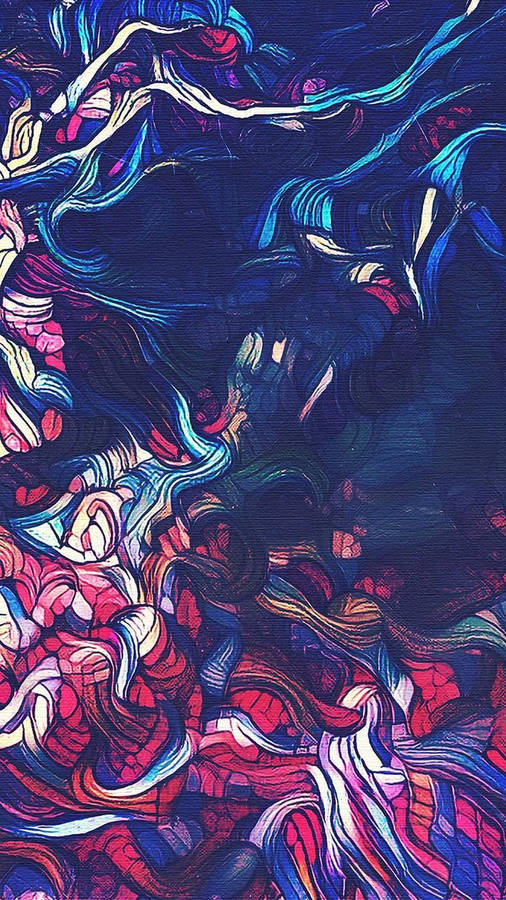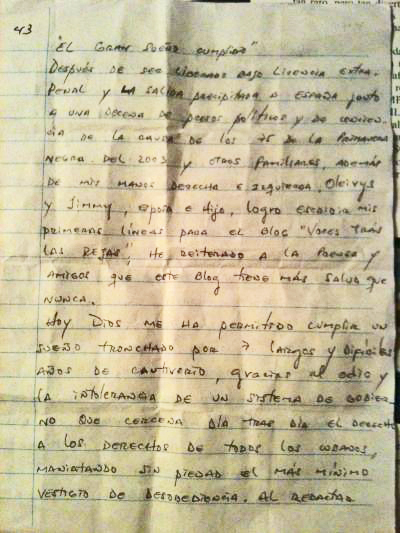 The following letter was written by Reynol Vicente Sanchez, a common prisoner who is currently in Combinado del Este.
The following letter was written by Reynol Vicente Sanchez, a common prisoner who is currently in Combinado del Este.
To Mr. Gerardo Hernandez Nordelo:
To classify the conditions which you were subjected to as torture is not only irrational but also very cynical on behalf of the Castro regime, for these inhumane conditions we prisoners on the island live under are truly abusive and degrading, and this has been happening for more than half a century. Here I am sending you a short description so that you could draw your own conclusions.
In any of the three buildings of Combinado del Este in the city of Havana, as in any of the many prisons throughout the island, the regime condemns its prisoners with the poorest diet any prisoner could be subjected to. It consists of 30 grams of rice and, as the main dish, a mix of flour with soy ground beef in a portion that is approximately 15 grams, and it is handed out between lunch and dinner with an egg which you realize is just a piece of yolk with remnants of shell when you’re done peeling it. Furthermore, a watered down and insipid pea soup is given to us by force along with more bread flour. Every fifteen days we receive a small quarter of chicken.
I’ve been in Building 1-2 North, in Detachment 3 company 1223 of Combinado del Este for exactly 6 months and 21 days. I live alongside 8 other prisoners. We are all basically living on top of each other in a jail cell that is 3 meters in width by 6 meters in length and 2 meters in height. The three single-person beds, which are separated by a mere 50 centimeters from each other, barely even fit in the cell. They are so closely placed to one another that one could even try to squeeze in a fourth one, as is done in many other cells. Furthermore, there is a tiny space for the foods that are brought to the recluses by their relatives (through much sacrifice) in order to prevent death by hunger.
It is normal for us to share our living space with roaches, rats, and mosquitoes. The roofs are sealed up with nylon in order to prevent bathroom residues to fall down on us from the floors above. That permanent dripping sound follows us all night long, every night, as if it was a musical backdrop. All prisoners are full of all kinds of parasites and bacterias. The water is not drinkable and it is scarce, and lack of hygiene is immense. Cleaning the cell consists of cleaning the beds only. The small hall between any of the bed bunks is barely ever cleaned, and the times that they are, it is very little and with dirty old rags which are so worn out that they can’t even dry a body. Yet, here we value them (the rags) as if they were treasure and we lend them to our companions or we ask prisoners from other cells for them.
In the very tiny spaces below our beds we keep our belongings, which are kept in bags or suitcases that often do not even fit down there alongside with our shoes, sandals, plastic water bottles, and our plates and spoons that we use daily to eat in an atmosphere of the worst imaginable hygienic conditions where we are constantly pestered by flies, roaches, and rats.
At the back of the 6 meter long cell lies the bathroom, which is 3 meters by 1.60. It is divided by two walls that create three very small spaces- one for showering, a latrine full of filth and sediments, and a washing room which consists of a tube without a sink. The tubes are plastic and are the same ones used to pass electric cables and together they conduce water towards the space where we shower where there is an old tank that is completely rusted and has been fixed at the bottom with cement. That is where we fill up our bottles, which we guard with our lives due to scarcity of water.
We don’t have any disinfectants, for the authorities of the jail do not give us any and they don’t let our families bring them when they visit. They also do not engage in any form of pest control, just like there is no mass effort to collectively combat rodents. This explains the presence of large bugs, rats, and mice, and also is the reason why roaches crawl over us while we are sleeping or even while we are awake. All the excrement and waste from the bathrooms in each cell do not circulate through a pipe system. Instead, it falls on the ground by the back walls of the building. There they produce gases which are carried upwards, producing scents that we constantly smell minute by minute, day by day.
You were in the hole for only 13 days, subjected to temperatures of up to 34 degrees. We live under similar temperatures during all the summer months on this island- a climate which you are very well familiar with. They don’t allow us to have fans, and much less any radios, and even if we had any it would be pointless because the country is going through one of its worst economic crisis ever, and for approximately one year now, they have prevented any form of flow of electricity to us, keeping us in our cells in pitch darkness. They don’t allow us to have any electric razors, yet they want us to constantly be well shaved. They sometime take us to get our hair cut before the chief of the building. As punishment, they remove our sentence reductions which are normally 2 months each year, alone with the allowed visits we have every 45 days and the conjugal meeting that we are permitted every 2 months.
In such meetings our families finds themselves forced to use the little they have in order to bring us bags of foods which normally contain crackers, sugar, milk in powder, and anything else that can be preserved and that is allowed during visits. If they bring us cooked meat we have to eat it within the first two days because we have absolutely no access to any sort of refrigeration.
With all the sincerity in the world, I must tell you that you have not traveled to any country in the world to fight against terrorism, but instead you have gone with the purpose of collaborating with this state-sponsored terrorism under which 11 million Cubans suffer. We live under an awful dictatorship which attempts to perpetually remain in power. Neither many kilometers of paper, or liters upon liters of ink, can ever be enough for me to narrate, with much detail, just how much Cuban prisoners suffer in this giant prison, the largest one in the universe.
A true example of torture is the case of the Cuban-American Yamil Dominguez Ramos, who as of today, has been carrying out a 118 day long hunger strike as he protests his unjust confinement. With pure conviction about his dignity and his values he has declared himself innocent of a false accusation of “human trafficking”- an accusation which has caused him a sentence of ten years of prison. What they cannot accept is that Yamil accepted the nationality of another country that has lent him a hand and given him the chance to grow and feel like a truly free man, something that continues being just a Utopian ideal for all of us Cubans.
I just hope that you are able to read this letter which I have written in my jail cell, number 1223, where I reside along 8 other companions and together, we are witnesses of each and every one one of my written words.
Without further adieu,
Reynol Vicente Sanchez
Translator: Raul G.
August 17, 2010

 Remembering the happy days is not a problem; forgetting the days of captivity is nearly impossible, for the wounds deeply scarred my soul. Now that I have more time to meditate, I ask myself: how did I survive so much human misery? A misery which is not only linked to the penal population, for I must say that I did meet many decent men in prison who were tossed down to that lower level world of captivity by the exclusive system which has been ruling in Cuba for more than half a century. Without realizing it, they have also becomes victims of the dictatorship.
Remembering the happy days is not a problem; forgetting the days of captivity is nearly impossible, for the wounds deeply scarred my soul. Now that I have more time to meditate, I ask myself: how did I survive so much human misery? A misery which is not only linked to the penal population, for I must say that I did meet many decent men in prison who were tossed down to that lower level world of captivity by the exclusive system which has been ruling in Cuba for more than half a century. Without realizing it, they have also becomes victims of the dictatorship. The political prisoner, Lamberto Hernandez Plana, declared himself on hunger strike on September 23rd.
The political prisoner, Lamberto Hernandez Plana, declared himself on hunger strike on September 23rd. Painting: “Lighthouse” by Seamus Berkley
Painting: “Lighthouse” by Seamus Berkley  (“Photo taken from blogforcuba.typepad.com”)
(“Photo taken from blogforcuba.typepad.com”) -Painting by Lori Mcnamara
-Painting by Lori Mcnamara -Painting by Sharon Cummings
-Painting by Sharon Cummings “Confusion Painting” by Keenya Woods
“Confusion Painting” by Keenya Woods The following letter was written by Reynol Vicente Sanchez, a common prisoner who is currently in Combinado del Este.
The following letter was written by Reynol Vicente Sanchez, a common prisoner who is currently in Combinado del Este.
 The prisoner Luis Alberto Rodriguez Camejo declared himself on hunger strike this past July 20th in the detachment known as Pending Trial No. 6, in cell 14 of the provincial prison of Canaletas in Ciego de Avila. Rodriguez Camejo is 43 years old and is a resident of 1st street on No. 75 South, between Honorato del Castillo and Paseo (in the central city neighborhood of Ciego de Avila). He finds himself rejecting any foods as a form of protest against his alleged conviction of armed robbery in a plastic arts warehouse. The actual thief, however, confessed to the crime and yet he is out in the street under a fee and owes 6 years of conditional freedom. He also has 9 other armed robberies under his belt that can be confirmed. It seems that the thief was released from accusations because his skin color is white while Rodirguez Camejo’s is black.
The prisoner Luis Alberto Rodriguez Camejo declared himself on hunger strike this past July 20th in the detachment known as Pending Trial No. 6, in cell 14 of the provincial prison of Canaletas in Ciego de Avila. Rodriguez Camejo is 43 years old and is a resident of 1st street on No. 75 South, between Honorato del Castillo and Paseo (in the central city neighborhood of Ciego de Avila). He finds himself rejecting any foods as a form of protest against his alleged conviction of armed robbery in a plastic arts warehouse. The actual thief, however, confessed to the crime and yet he is out in the street under a fee and owes 6 years of conditional freedom. He also has 9 other armed robberies under his belt that can be confirmed. It seems that the thief was released from accusations because his skin color is white while Rodirguez Camejo’s is black.

